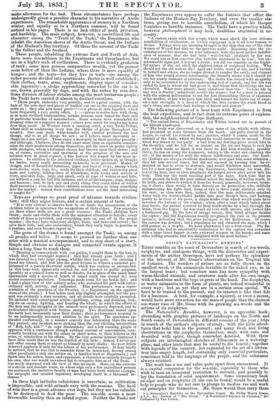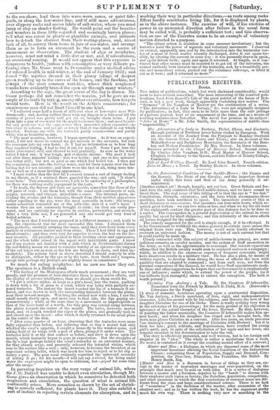GOSSE'S NATURALIST'S RAMBLES. * THESE rambles on the coast of Devonshire
in search of sea-weeds, zoOphytes, and analogous things, with the discoveries and experi- ments of the author thereupon, have not perhaps the splendour or the interest of Mr. Gosse's observations on the Tropical life of Jamaica. The wonders of nature are as fully shown in the smallest weed, or the animalcule invisible to the naked eye, as in the largest beast; but somehow man has more sympathy with warm-blooded animals, and creatures made after his own image, with a backbone and the type or germ of the hand. The Zoophytes, or water animantia in the form of plants, are indeed wonderful in every way; but as yet they are in a certain sense special. We have to be trained to the pursuit, and its interest is like that felt for a business. A bird, for example, a squirrel, or even a mouse, would have more attraction for the mass of people than the choicest sea-water vase of Mr. Gosse with its growing sea-weeds and the actions of its zoophytes. The Naturalist's Rambles, however, is an agreeable book; abounding with graphic pictures of landscape on the North and South coasts of Devonshire in different seasons of the year ; trips in search of the author's objects of study, with the little adven- tures that befel him in the pursuit ; and many, fresh and living observations on the zoophytes themselves, made with care, and described with spirit, though somewhat detailed. With these subjects are intermingled sketches of Ilfracombe as, a watering- place, and other hints that may be useful to the tourist; together with legends of the country, not expanded by the art of a httera- teur into empty length, but containing only essential particulars, sometimes told in the language of the people, and the substance always retained. The work has a use and value quite apart from amusement. It is a capital companion for the sea-side, especially to those who wish to turn an occasional recreation to account, and possibly to lay the foundation of solid acquirement. Some elementary book on alga) and on zoOphytes (if one can be found) would be a useful help to people who do not care to plunge in medias res and work out principles for themselves. Mr. Gosse would then carry them
• A Naturalist's Rambles on the Devonshire Coast. By Philip Henry Gosse, A.L.S., Sm., Author of "The Ocean," "A Naturalist's Sojourn in Jamaica," Pm. Published by Van Voorst.
to the sea-shore, lead them into wave-worn eaves, or quiet tide- pools, or along the low-water line, and-if still more adventurous, over slippery rocks and across inlets of salt-water, where you must jump or step on slender footing. He would point out the beauties and wonders in these little-regarded and seemingly barren places ; tell what was rarest in plants or plantlike animals, and intimate how to detach the choicest from their resting-places, and, nicest task of all, to convey them home in jars of sea-water, and arrange them so as to form an ornament to the room and a source of amusement or observation. The student of algoe or zoiiphytes, however, must not mind a little dirt or wet, and, if adventurous, an occasional sousing. It would not appear that this exposure is dangerous to health, (unless with consumptive or very delicate pa- tients,) since Mr. Gosse went to Devonshire under medical advice fur relaxed health in mid-winttr, at the end of January l832; and found "the myrtles dressed in their glossy foliage of deepest green reaching up to the eaves of the houses, and the fuschias, not always ef the most common varieties, whose thick roughened tiunks have evidently braved the open air through many winters." According to the sage, the great event of the day is dinner. Mr. Gosse perhaps did not remember the maxim, yet he gave an ex- ample of its truth by tryieg, among other experiments, how his pets would taste. Here is the result on the Actinia caussicornis ; for omnivorous man did not limit himself to one kind.
" I collected some half ti dozen of different sizes at low-water near Wil- dersmouth ; and, having rubbed them with my fingers in a tide-pool till the coating of gravel was pretty well got rid of, brought them home. I put them into a pan of sea-water for the night to cleanse them ; and most beauti- ful and gorgeous was the appearance they presented when expanded—no two alike in colours, and yet all so lovely that it was difficult to say which excelled. Perhaps one with the tentacles partly cream-colour and partly white was as beautiful as any.
" The next morning, however, I began operations. As it was an experi- ment, I did not choose to commit my pet morsels to the servants, but took the saucepan into my own hand. As I had no information as to how long they required boiling, I had to find it out for myself. Some I put into the water (sea-water) cold, and allowed to boil gradually. As soon as the water boiled I tried one : it was tough, and evidently undone. The next I took out after three minutes' boiling : this was better; and one at five minutes' was better still ; but not so good as one which had boiled ten. I then put the remaining ones into the boiling water, and let them remain over the fire boiling fast for ten minutes; and these were the best of all, being more ten- der as well as of a more inviting appearance.
"I must confess that the first bit I essayed caused a sort of lumpy feeling in my throat, as if a sentinel there guarded the way, and said, It shan't come here.' This sensation, however, I felt to be unworthy of a philosopher, for there was nothing really repugnant in the taste. * * * "In truth, the flavour and taste are agreeable, somewhat like those of the soft parts of crab : I ate them hot, with the usual crab condiments of salt, pepper, mustard, and vinegar, mixed into a sauce. The internal parts, in- cluding the ovaries and the tentacles, though from their mottled appearance rather repelling to the eye, were the most agreeable in taste : the integu- ments somewhat reminded me of the jelly-like skin of a calf's head. I wonder they are not commonly brought to table ; for they are easily pro- cured, and are certainly far superior to cockles, periwinkles, and mussels. After a very little use, I am persuaded any one would get very fond of boiled actinias.
"The next that I tried were prepared in a different manner ; and, truth to say, the experiment was far more successful this time. I cleansed them more perfectly, carefully scraping the bases, until they were freed from every particle of extraneous matter and from slime. These I had fried in egg and bread-crumbs ; and they were very far superior to even the best on the for- mer occasion. All prejudice yielded to their inviting odour and appearance, and the whole table joined in the repast with indubitable gusto. I know not if my readers are familiar with a dish which in Newfoundland during the cod-fishing season we used to consider worthy of an epicure—the tongues of the cod taken out as soon as the fish are brought on shore, and fried im- mediately. The actinias fried as above described I should scarcely be able to distinguish, either by the eye or by the taste, from fresh cod's tongues, except that perhaps my proteges are slightly firmer in consistence."
So much for eating zoiiphytes : let us now see how they eat. The specimen is a British coral.
"The feeding of the Madrepores affords much amusement ; they are very greedy, and the presence of food stimulates them to more active efforts, and the display of greater intelligence, than we should give them credit for.
"I put a minute spider, as large as a pin's head, into the water, pushing it down with a bit of grass to a coral, which was lying with partially ex- posed tentacles. The instant the insect touched the tip of a tentacle it ad- hered, and was drawn in with the surrounding tentacles between the plates, near their inward margin. Watching the animal now with a lens, I saw the small mouth slowly open, and move over to that side, the lips gaping un- symmetrically ; while at the same time by a movement as imperceptible as that of the hour-hand of a watch, the tiny prey was carried along between the plates towards the corner of the mouth. The latter, however, moved most, and at length reached the edges of the plates, and gradually took in and closed upon the insect : after which it slowly returned to its usual place in the centre of the disk.
"After some quarter of an hour, observing that the tentacles were more fully expanded than before, and inferring that so tiny a morsel had only whetted the coral's appetite, I caught a house-fly in the window-pane, and taking hold of its wings with a pair of pliers, plunged it under water. The tentacles held it at the first contact as before, and drew it down upon the mouth, which instantly began to gape in expectation. But the struggles of the fly's legs perhaps tickled the coral's tentacles in an unwonted manner, for they shrank away, and presently released the intended victim, which rose to the surface like a cork.; only, however, to become the breakfast of an expectant aetinia bellis, which was much too wise to reject or to let slip so dainty a prey. The poor coral evidently regretted the untoward necessity of letting it go ; for his mouth—I will not say watered, for being under water the expression might be open to criticism, but—gaped for some time after the escape."
In pursuing inquiries on the very verge of animal life, where Sir J. G. Dalyell was unable to detect even circulation, though Mr. Gosse gives an observation in which he conceives he detected both respiration and circulation, the question of what is animal life continually arises. Mere sensation as shown by the act of shrink- ing is scarcely sufficient, for plants have it. They also exhibit a sort of instinct in rejecting certain elements for absorption, and in working their way in particular directions,—as roots among rocks Effort hardly constitutes living life, for it is displayed by plants, as in the above instance. The exercise of will, if the exercise of power in an unwonted direction after failure in the usual form may be called will, is probably a sufficient test ; and this observa- tion on one of the Eucratea seems to be an example of voluntary motion directed to a purpose.
"The ciliary action is doubtless in some measure involuntary ; but the tentacles have the power of separate and voluntary movement. I observed in an animal, apparently annayed by the introduction to the tentacular vor- tex of a mass of heed matter recently discharged, drive it out again for- cibly, by altering the current in some way : it was presently drawn in again, and again driven forth; again and again it returned. At length, as if con- vinced that other means must be resorted to to get rid of the intrusion, the animal suddenly bent inwards one of the tentacles, and, by a beautifully pre- cise and momentary action, pushed out the substance sideways, or lifted it out as it were ; and it returned no more."



































 Previous page
Previous page